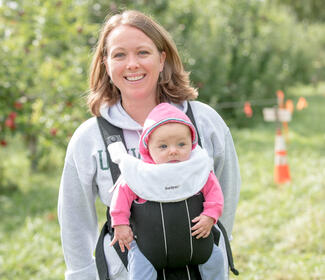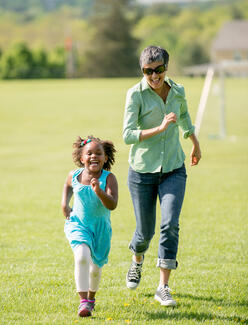
Helping you keep your child safe, healthy and growing well is important to the Department of Health. We have resources to support your family’s wellbeing and nutrition, and your child’s development.
If you are an educator or provider looking for resources, please see the Resources for Educators and Providers page.
As your child grows and develops, their nutritional needs also change. When babies are first born, they can get all the nutrients they need from human milk and/or formula. Breast or chestfeeding can be a good option for many families. Talk to your health care provider or your WIC nutritionist about breastfeeding/chestfeeding to decide if it is the right choice for you.

Solid foods are generally added into your baby’s diet beginning around 6 months of age. Your child’s health care provider, your WIC nutritionist, or your home health nurse can advise you on when and how to introduce foods to your baby. As your child grows, having relaxed family mealtimes with a variety of healthy foods can support good eating habits.
| Resource | Description |
|---|---|
| WIC | Healthy foods, nutrition education, breastfeeding/chestfeeding support, and helpful referrals for pregnant and postpartum individuals, parents and caregivers with children under 5. Purchase foods at grocery stores and co-ops. Farmers market coupons available during the summer. |
| Vermont Food Help | 3SquaresVT is a program that provides people with money on an electronic benefits transfer (EBT) card, which works like a debit card. EBT cards can be used to purchase food at grocery and convenience stores, co-ops, and many farmers markets. |
| Vermont Food Bank - Food Shelves | Find a food shelf or meal site near you. |
Children learn about themselves and the world around them through movement and play, so play every day! Babies need safe opportunities to move and explore. They love “floor time” where they can reach, roll and crawl. As they get older, children need supervised and independent playtime as well as planned activities where they can practice physical skills.
Being active helps children:

- Feel good about themselves
- Be healthier
- Sleep better at night
- Enjoy family time
| Resource | Description |
|---|---|
| Move Your Way | Tool to help your child be physically active throughout the day. |
| Find and Go Seek | Weekend events, after-school activities, camps, festivals, story times and so much more happening in Northern Vermont. |
| Vermont State Parks | Find a state park near you. |
| National Wildlife Federation Nature Find | Information on parks, museums, events, and more near you. |
Childhood experiences, positive or negative, can have a major impact on long-term growth, development, and health. Negative experiences are often referred to as toxic stress or adverse childhood experiences (ACEs). Abuse, neglect, witnessing domestic violence, parental substance use disorder and/or mental illness, divorce, and economic hardship are all examples of ACEs. There is a connection between the number of adverse experiences an individual has had and the risk for health and social problems in adulthood.
Vermont wants to support you to help prevent ACEs and help build resilience in yourself and your family. One proven way to prevent ACEs is through our voluntary home visits for pregnant and postpartum families. If you are interested in participating in one of the home visiting programs, ask your child’s provider for a referral, or call Help Me Grow at 211 extension 6, and ask for home visiting support.
| Resource | Description |
|---|---|
| Getting to Know Your Baby | Information on understanding and responding to your baby’s cues. |
| Vermont 211 | Connecting you with help and resources. |
| Help Me Grow | Promotes the healthy development of your child by linking children and families to the services and supports. |
There are many helpful community resources to help families with questions related to health and safety.
| Resource | Description |
|---|---|
| American Academy of Pediatrics Oral Health page | Learn what you can do to keep your child’s smile healthy and prevent tooth decay. |
| Vermont Department of Health Oral Health Program | Learn about Vermont resources for oral health. |
| Children’s Environmental Health | Learn about environmental hazards and preventing exposure for children. |
| Healthy Homes | Simple steps to keeping your home and family healthy and safe. |
| Child Abuse Prevention | Learn about child abuse and Vermont resources to help keep your child safe. |
| Domestic and Sexual Violence | Learn about domestic and sexual violence, and Vermont resources to help keep your family safe. |
| Child Passenger Safety | Learn about car seat safety. |
